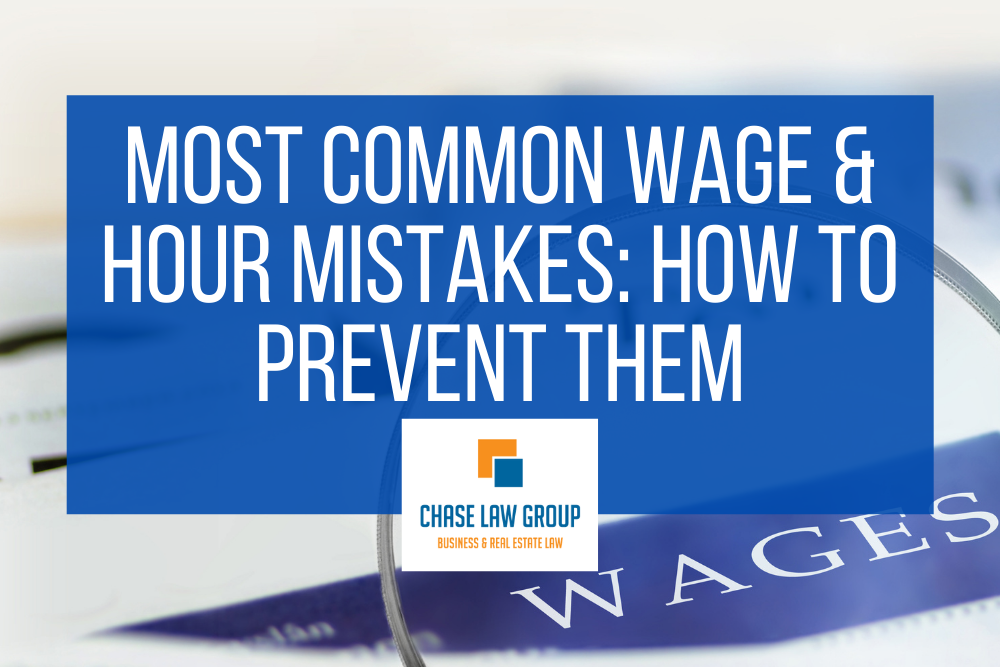The Most Common Wage and Hour Mistakes Employers Make and How to Prevent Them
By Admin March 08, 2022 Category: Business Law

Doing business in California, and having employees requires a keen awareness of the risks involved and how to avoid them, particularly when it comes to California’s extensive wage and hour laws. Violations of these laws, even if unintentional, can result in substantial penalties and owed wages. However, much of this risk can be prevented by avoiding common mistakes and ensuring that your company’s wage and hour practices and policies comply with California law. The following are the most common wage and hour mistakes made by employers:
Failing to Keep Accurate Time Keeping Records including Meal and Rest Periods
Employers frequently fail to maintain accurate time records, and instead rely upon poorly constructed documents that don’t show the actual hours worked and confirms that meal and rest breaks were taken. Employers should use timekeeping software that employees can log on to record their hours worked and breaks taken. Alternatively written time sheets should be obtained from employees which they sign that also confirm they took their breaks and when they were taken Thereafter, employers should review the time records for each pay period to confirm accuracy, including whether meal and rest periods were taken and overtime accounted for. When meal and rest periods are not taken, employees are owed one hour of wages in penalties that should be paid by the employer. (This can help establish that the company monitored and complied with applicable wage and hour requirements should a lawsuit be filed.) Employers can and should still counsel and discipline employees who fail to take their breaks, but the employees must be paid for the work time they performed, even if done without the employer’s permission.
Not Maintaining Accurate and Compliant Wage Statements
California has very specific wage statement requirements that require a number of different types of information on each pay stub that is issued to an employee when compensation is paid. Employers commonly fail to ensure that all the required information is included in the paystubs. A failure to provide all required information on the paystubs will result in penalties for each item not properly and correctly set forth in the paystub, which is then multiplied by every pay period that the infraction occurred. Pay stub penalties can add up quickly over time, resulting in surprisingly large amounts owed to employees. Companies should have an experienced employment attorney review their paystubs to ensure they meet California strict requirements.
Not Paying The Correct Rates of Pay
California minimum wage is currently $15.00 per hour for employers with 26 or more employees and $14.25 for employers with 25 or fewer employees. Additionally, employers must pay overtime to non exempt employees for all work in excess of 8 hours in a day or 40 in a week. Double rate is owed for time spent in any day that exceeds more than 12 hours. Employers often fail to pay for overtime hours worked or pay their employees a flat daily rate. When this occurs, the employer owes overtime pay at 1.5 times the hourly rate and liquidated damages equal to the unpaid overtime that is owed. Additionally, in the event an employee reports to work but is told that no work is available or less than half of the scheduled work is available to them, employers must pay reporting pay. Reporting pay requires payment of the employee’s usual or scheduled day’s work and in no event less than two hours and no more than four hours at the employee’s regular rate of pay.
Improperly Classifying Workers As Independent Contractors
Employers routinely misclassify employees as independent contractors resulting in significant owed wages and penalties. In California, workers are employees unless the employer can prove they are independent contractors by showing the existence of all of the following factors: (A) The person is free from the control and direction of the hiring entity in connection with the performance of the work, both under the contract for the performance of the work and in fact; (B) The person performs work that is outside the usual course of the hiring entity’s business; and (C) The person is customarily engaged in an independently established trade, occupation, or business of the same nature as that involved in the work performed. Although there are several exemptions to this test, they apply to limited industries and workers. Failing to correctly classify a worker as an employee can result in significant owed wages and penalties. You should consult with an experienced employment attorney if you are treating any workers as independent contractors to ensure they are classified correctly.
Failing To Properly Classify Employees As Exempt Or Non Exempt
All California employees are to be paid on an hourly basis and provided meal and rest periods unless they meet a limited number of exemptions under California law. The primary exemptions are the Executive, Professional and Administrative exemptions. By improperly classifying an employee as exempt when they are truly nonexempt, an employer will owe overtime and penalties for meal and rest periods, assuming the employee did not receive them as required by law. Companies should consult with an employment attorney to ensure they have properly classified their employees.
Gain Peace of Mind With An Employment Audit From Chase Law Group
If you believe that you have made one of the mistakes outlined above, or have questions or concerns about any of these issues, contact our employment attorney, Scott Liner at [email protected]. Chase Law Group offers an employment audit that includes a review of your wage and hour practices and policies as well as a review of all other applicable employment policies and practices. Contact Chase Law Group to schedule your Annual Employment Law Evaluation.

